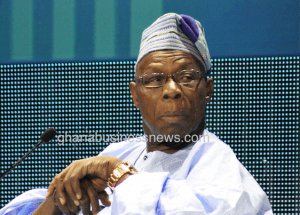Boko Haram founder was unemployed graduate – Obasanjo on security in Africa

Graduate unemployment on the African continent has been cited as a factor leading to security threats on the continent.
The founder of the Islamist insurgent group in Nigeria, Boko Haram was a university graduate who couldn’t find a job and driven by desperation he turned against Western education and formed the group that became violent after his death.
Speaking at the session titled ‘Development and Security – Dealing with new Threats’ at the ongoing Annual Meetings of the African Development Bank (AfDB) in Abidjan, Cote d’Ivoire Tuesday May 26, 2015, former Nigerian president, Olosegun Obasanjo said Mohammed Yusuf was a university graduate who couldn’t find a job. In his desperation, he called other university graduates in his community and asked them what Western education has been able to do for them, he said.
According to Obasanjo, Yusuf then asked his friends to tear and burn their certificates as they were worthless.
That, Obasanjo said was the beginning of the group that was formed in 2002. The official Arabic name of the group is Jama’atu Ahlis Sunna Lidda’awati wal-Jihad, which means “People Committed to the Propagation of the Prophet’s Teachings and Jihad” and initially opposed to Western education.

Yusuf was killed in police custody in 2009. The group became violent after his death. It has also pledged allegiance to IS.
Several villages have been destroyed, more than 12,000 people killed, and thousands have been abducted by the group. However, a joint military campaign involving the Chadian and Nigerian military in recent times has put the group under great pressure as it has lost territories and several of its fighters.
Obasanjo indicated that the education gap between the northeastern part of Nigeria and the South is too wide.
“The current violent situation in Nigeria has direct correlation to education. The south has 79 percent educated while the northeast has 19 percent,” the former president said.
“Religious fundamentalism feeds on under-development,” he said.
He also noted that there are new items apart from terrorism that pose security threats on the continent, and these he said are Ebola, immigration, which is leading to xenophobia, human trafficking and drug trafficking.
On why the Nigerian military was unable initially to respond to the Boko Haram threat, Obasanjo said, the Nigerian military was trained to fight conventional battles and they “weren’t trained to fight a fleeting enemy enemy like Boko Haram.”
“Corruption among high ranking military officers was also a reason why the military was unable to fight and they were ill equipped as well,” he said.
President Filipe Nyusi of Mozambique who was also on the panel, cited exclusion in the political process and maritime piracy as some of the factors creating insecurity on the continent.
The panelists called on African governments to invest in development and job creation.
Dr. Nkosazana Dhlamini Zuma, Chair of the African Union (AU) asked African governments to “pay more attention to development and fix bad governance.”
“We should invest in holistic development, trade among each other and industrialize,” she said.
“These developments are not just threats to Africa, they are global threats,” she said.
By Emmanuel K Dogbevi, in Abidjan, Ivory Coast
